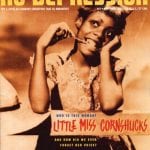Bill Carlisle: 1908 to 2003
Bill Carlisle — who died March 17 at age 94 — was born in Wakefield, Kentucky at the dawn of relativity theory, and the four-foot-high stage jumps that became his trademark also modified Newtonian physics. His hillbilly boogie leered louder and grooved harder than the white rock ‘n’ roll it anticipated. Like his R&B contemporary Louis Jordan (who was born six months before him in 1908), Carlisle achieved commercial success on the strength of a vulgar sense of humor, a lunatic flair, and a circumscribed but fierce-burning talent. He was our last living link to country music’s first generation of recording artists.
Carlisle worked radio barndances and tent shows with his family from an early age. The first indication of his musical singularity came in 1932, when he wrote the swaggering yodel classic “Rattlesnakin’ Daddy”. From the mid-’30s through the late ’40s, he and his older brother Cliff — an accomplished blues musician and early dobroist — worked as the Carlisle Brothers. Recording for King and other labels, they scored a number of uptown folk-blues hits, notably 1948’s “Rainbow At Midnight”.
It was in the mid-’40s, during a long stint at Knoxville’s WNOX, that two fateful figures emerged. One was an ambitious and abundantly gifted teenager named Chet Atkins, whom Carlisle quickly hired as his on-air accompanist. The other was a persona invented by Carlisle, a character called Hotshot Elmer, who ran through audiences leaping over chairs. With his 1951 signing to Mercury, Carlisle flexed his newly-toned comic muscle and finally found his full and natural voice.
“Too Old To Cut The Mustard”, a mock lamentation of impotence, and the career hit “No Help Wanted” inaugurated a decade of like novelties for the Carlisles — a brand name that guaranteed no constants except for Carlisle himself and (usually) Atkins, the former instantly recognizable by his barrel-chested codgerly yowl and buzzingly muted acoustic guitar, the latter soloing at his most daredevil edge. This peculiar balance of grace and hysteria elevated the Carlisles’ records well above their cornpone competition.
“I can jump as high as I used to,” he would remark during his long September, “I just can’t stay up as long.” In his last 40 years he appeared regularly on the Grand Ole Opry, where, finally, he sang clutching a walker, jauntily throwing it over one shoulder at the end of his segments. Such were the weekly coups de theatre of an instinctual showman. We behind the curtain could see him sinking heavily into a wheelchair and fading quietly down the hall.
So it slayed them in the sticks: but how will ditzy women drivers, shotgun-toting fathers-in-law-to-be, and words such as “booger” play to posterity? Much of the topical content of the Carlisles’ music is already obscure, and schoolboy sniggering will ever be disdained by polite opinion. But there is a quality, radiated by Bill in his life and performance, that disarms analysis — a headlong exuberance that transcends theatrics. My bet is that his ’50s records, notwithstanding their current unavailability on CD, will always sound fresh and triumphant.




